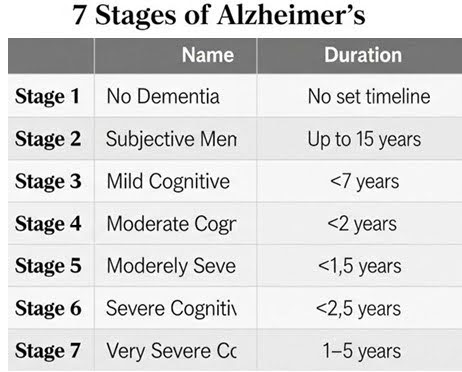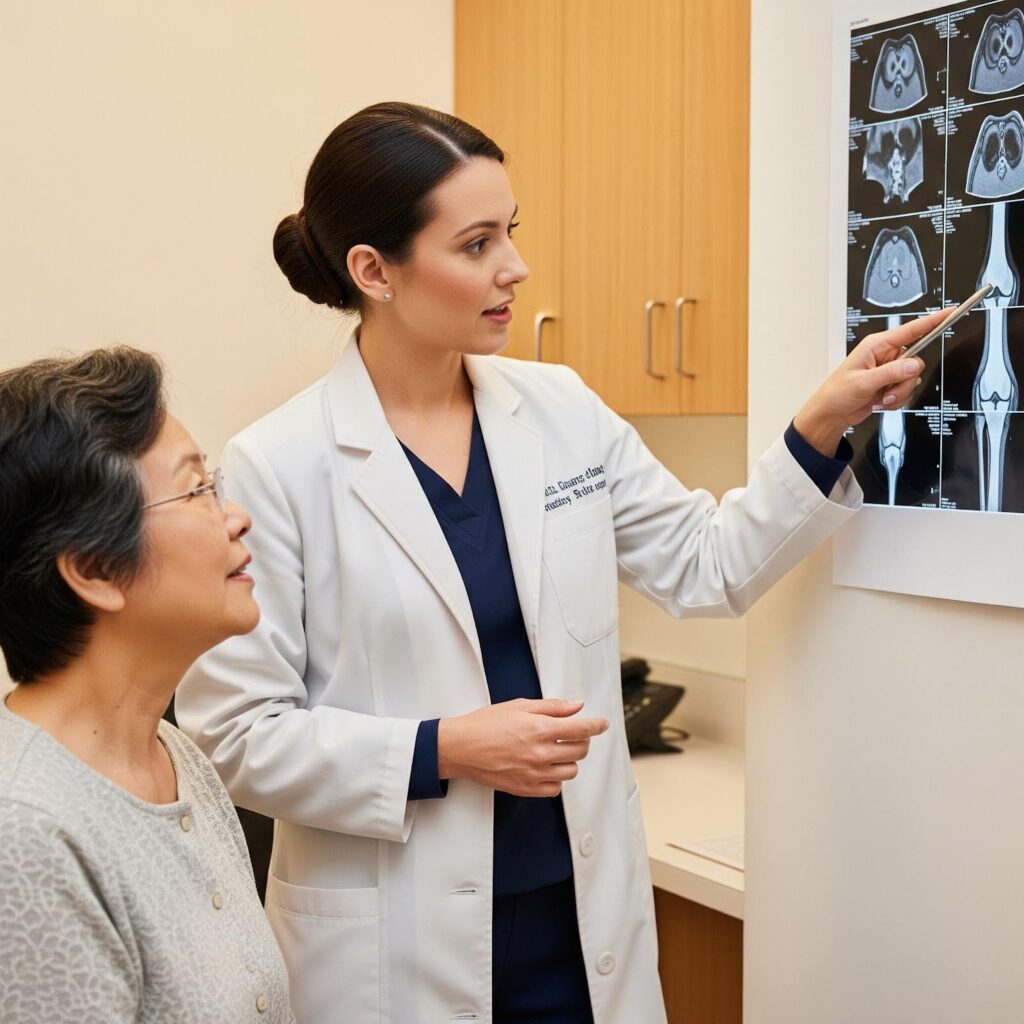How Long Do the 7 Stages of Alzheimer’s Last?
September 5, 2025
Alzheimer’s disease is a progressive brain disorder that affects memory, thinking, and behavior. It doesn’t happen overnight, instead, symptoms develop gradually over several years. Understanding how long the 7 stages of Alzheimer’s last can help families prepare for the journey ahead.
In this guide, we’ll walk you through what are the 7 stages of Alzheimer’s disease, explain how long each stage typically lasts, and answer common questions such as what is the longest stage of Alzheimer’s disease.
If you or a loved one has been diagnosed, remember: early and ongoing primary care can make a big difference in managing health and quality of life. To get comprehensive primary care, become a patient today.

How Many Stages of Alzheimer’s Are There?
Doctors often describe Alzheimer’s progression in seven stages, from no symptoms at all to very severe cognitive decline. These stages are based on the Global Deterioration Scale, which measures memory, cognitive ability, and daily functioning. While timelines can vary from person to person, here’s what each stage generally looks like.
Below we have a list of the alzheimer stages and an estimation of how long do the 7 stages of Alzheimer’s might last
Stage 1: No Dementia
Duration: No set timeline, the person is cognitively healthy.
In stage 1, there are no signs of memory loss or cognitive decline. A person functions normally in daily life, and Alzheimer’s is not detectable. Occasional forgetfulness (like misplacing keys) is normal at this stage.
Stage 2: Subjective Memory Loss
Average Duration: Up to 15 years in otherwise healthy individuals.
This stage is sometimes called subjective cognitive decline. The person notices small memory slips like forgetting names or misplacing items but others may not notice. Symptoms are mild and don’t yet impact daily life.
Stage 3: Mild Cognitive Impairment (MCI)
Average Duration: Around 7 years.
Here, changes become noticeable to close friends or family. The person might repeat questions, have trouble focusing, or struggle to organize events. At this point, it’s important to see a doctor to rule out other causes and possibly start interventions.
To get comprehensive primary care, become a patient today.

Stage 4: Moderate Cognitive Decline (Mild Dementia)
Average Duration: About 2 years.
The person may have trouble managing finances, shopping, or remembering recent events. While they can still live independently, daily activities become more challenging. Emotional withdrawal and denial are common in this stage.
Stage 5: Moderately Severe Cognitive Decline (Moderate Dementia)
Average Duration: Around 1.5 years.
This is the point where a person can no longer live alone safely. They may forget important details about their life, such as their address, and need help choosing appropriate clothing. Behavior changes like suspicion or irritability may appear.
Stage 6: Severe Cognitive Decline (Moderately Severe Dementia)
Average Duration: About 2.5 years.
Daily living skills like dressing, bathing, and toileting require assistance. Memory loss is profound — the person may not recognize close family members. Emotional symptoms like anxiety, fear of being alone, or agitation are common.
This stage is made up of multiple substages, from losing the ability to dress independently to experiencing incontinence.
Stage 7: Very Severe Cognitive Decline (Severe Dementia)
Average Duration: 1–5 years, depending on health and care quality.
This final stage involves complete dependence for daily activities. Speech becomes very limited, mobility is lost, and reflexes may return to an infant-like state. Many people in this stage eventually pass away from complications like pneumonia.

What Is the Longest Stage of Alzheimer’s Disease?
For many individuals, Stage 2 (subjective memory loss) can last the longest — sometimes 15 years before significant functional decline begins. However, Stage 3 (mild cognitive impairment) can also last several years, especially if the person is otherwise healthy and receives proper care.
| Stage | Name | Average Duration |
| Stage 1 | No Dementia | No set limit |
| Stage 2 | Subjective Memory Loss | Up to 15 years |
| Stage 3 | Mild Cognitive Impairment | ~7 years |
| Stage 4 | Moderate Cognitive Decline | ~2 years |
| Stage 5 | Moderately Severe Cognitive Decline | ~1.5 years |
| Stage 6 | Severe Cognitive Decline | ~2.5 years |
| Stage 7 | Very Severe Cognitive Decline | 1–5 years |
Living with Alzheimer’s: Why Primary Care Matters
While Alzheimer’s cannot be cured, early detection and supportive care can help maintain quality of life longer. Primary care providers play a crucial role in managing other health issues, coordinating with specialists, and supporting caregivers.
To get comprehensive primary care, become a patient today.
FAQs About the 7 Stages of Alzheimer’s Disease
While there’s no cure, medications, healthy lifestyle choices, and regular primary care can help slow progression and improve quality of life.
Most people with Alzheimer’s progress through these stages, but the speed and symptoms can vary.
Stages 6 and 7 are often the most demanding because the person requires full-time assistance.
No, Alzheimer’s is a type of dementia. Dementia is a general term for memory and thinking problems that interfere with daily life.
The average lifespan is 4–8 years after diagnosis, but some live 10 years or more, depending on overall health and care quality.
MCI involves noticeable memory changes without major impact on daily life. Early Alzheimer’s begins when memory loss starts to significantly affect independence.
Sources:
https://www.alzheimers.org.uk/about-dementia/stages-and-symptoms/later-stages-dementia


